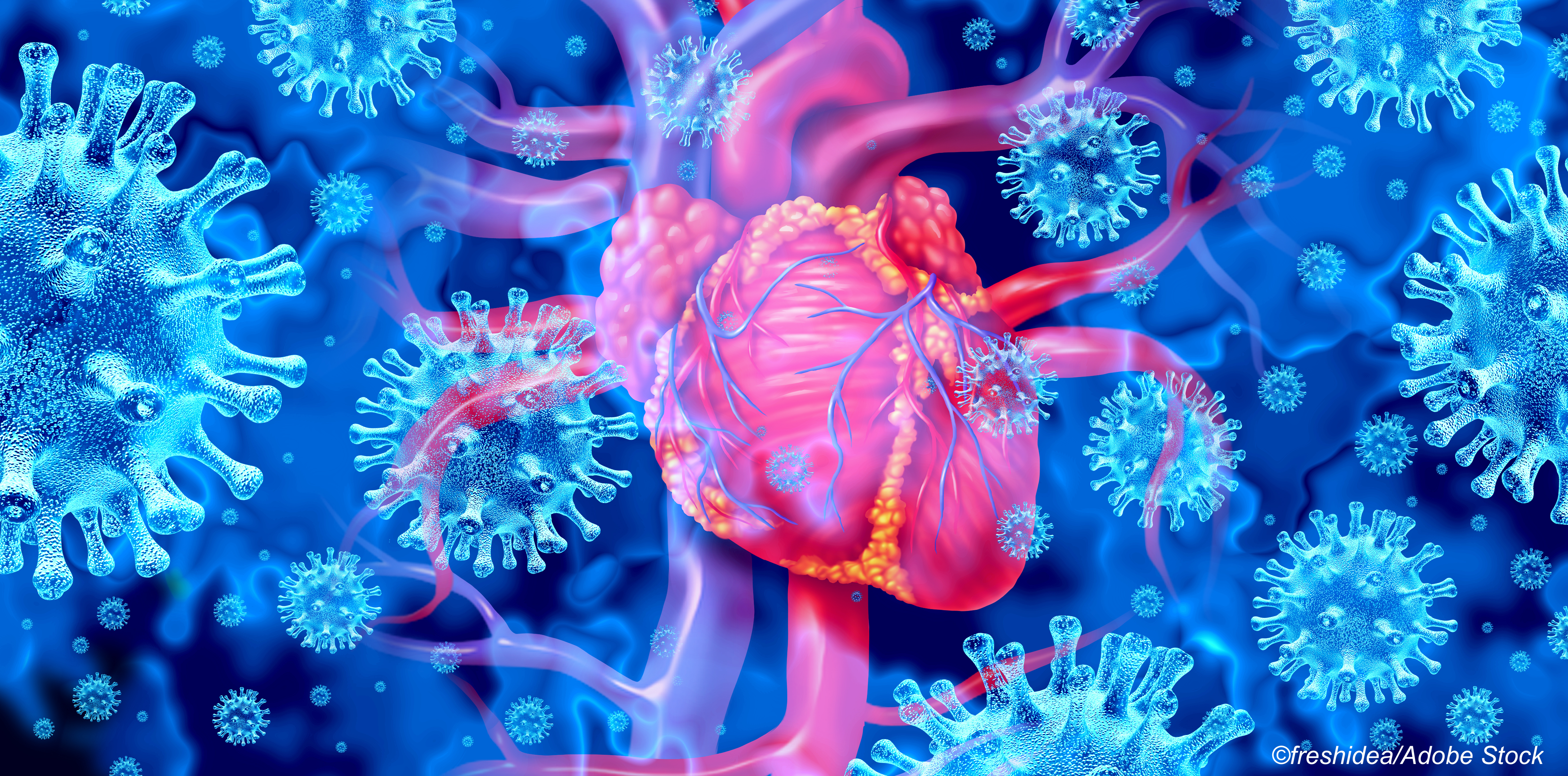Myocarditis was found to be a rare and mostly mild side effect of Covid-19 mRNA vaccination in a newly published analysis of real-world data involving close to 2.4 million recipients of either the BNT162b2 or mRNA-1273 vaccines.
Fifteen confirmed cases of the disorder—characterized by inflammation of the heart muscle—occurred among the cohort of adults age 18 and older after either the first (n=2) or second (n=13) dose of mRNA vaccine. This represents an observed incidence of 5.8 cases per 1 million people within 10 days of full vaccination with a second vaccine dose.
All 15 cases occurred among males, and the median age of those confirmed to have myocarditis was 25 (range: 20-32) years. Symptoms resolved with conservative management in all cases, with no patients requiring ICU admission or readmission after hospital discharge.
Writing in JAMA Internal Medicine, published online Oct. 4, researcher Anthony Simone, MD, of Kaiser Permanente Los Angeles Medical Center, and colleagues noted that the study is among the largest evaluations reported to date identifying acute myocarditis following mRNA vaccination within an integrated U.S. health care system.
“This vaccinated cohort is unique in its racial and ethnic diversity and in receiving care at community hospitals with treatment reflective of real-world practice,” they wrote.
The researchers calculated incidence rates and confidence intervals of myocarditis “using vaccine administration as the denominator,” and compared the incidence of myocarditis among exposed Kaiser Permanente Southern California (KPSC) members and unexposed members between December 14, 2020, and July 20, 2021, as well as among people vaccinated for other causes during a 10-day period 1 year prior to the study period.
Cases of myocarditis were identified from clinician reports to KPSC’s Regional Immunization Practice Committee “and by identifying hospitalization within 10 days of vaccine administration with a discharge diagnosis of myocarditis.” All cases of myocarditis were independently verified by at least two cardiologists. Myocarditis was confirmed using the following criteria:
- “Symptoms consistent with myocarditis.
- “Elevated troponin I level.
- “No evidence of obstructive coronary artery disease [via CT or cardiac catheterization].
- “No other identifiable cause.”
Just under half (46%) of the cohort of 2.39 million KPSC members who received either theBNT162b2 (n=50%) or mRNA-1273 (n=50%) vaccines were male, 31% were White, 6.7% were Black, roughly 37.8% were Hispanic, and 14.3% were Asian. Median age was 49 years.
Among the 15 participants with confirmed myocarditis following vaccination, nine were White, four were Hispanic, one was Asian, one was of unknown ethnicity, and none were Black.
Eight of the individuals who developed myocarditis received the BNT162b2 vaccine and seven the mRNA-1273 vaccine. In addition, eight of the 15 cases occurred in males between the ages of 18 and 25 years, while seven cases occurred among men ages 26 to 40 years old. Chest pain was reported in all 15 cases, occurring within 1 day of vaccination in three cases, two days of vaccination in two cases, three days of vaccination in six cases, and 4-to-7 days of vaccination in four cases. None of the cases had previous cardiac disease, and all were hospitalized and tested negative for SARS-CoV-2 at hospital admission.
Among the unexposed cohort, a total of 75 cases of myocarditis occurred during the period, with 52% of cases occurring among males. The median age of the myocarditis cases among the unexposed cohort was 52 years (range was 32 to 59 years).
In a commentary published with the study, JAMA editors Vinay Guduguntla, MD, of the University of California, San Francisco, and Mitchell Katz, MD, of NYC Health + Hospitals, New York City, noted that prior analysis of the Vaccine Adverse Event Reporting System (VAERS) revealed that acute myocarditis has been reported as a very rare adverse event with other vaccines.
A 2018 analysis of VAERS data showed signals for myocarditis and pericarditis associated with vaccination against typhus, Japanese encephalitis, anthrax and meningococcus, but the researchers characterized the occurrence of these adverse events as extremely rare among vaccine recipients.
Guduguntla and Katz noted added that the risk “is small when weighed with the morbidity and mortality of Covid-19 infection, in which up to 28% of hospitalized patients showed signs of myocardial injury.”
“Randomized clinical trials show that Covid-19 mRNA vaccines represent a safe and effective method of preventing infection; the identification of rare myocarditis does not change clinical decision making. However, it would be worthwhile to identify the mechanism of cardiac injury from vaccines. In addition, we anticipate seeing more cases of myocarditis, as vaccination was recently approved for teenage males age 12 to 16 years,” they wrote.
-
Myocarditis was found to be a rare and mostly mild side effect of Covid-19 mRNA vaccination in a newly published analysis of real-world data involving close to 2.4 million recipients of the vaccines.
-
Fifteen confirmed cases of the disorder, characterized by inflammation of the heart muscle, occurred among the cohort of adults ages 18 and older after either the first (n=2) or second (n=13) dose of mRNA vaccine.
Salynn Boyles, Contributing Writer, BreakingMED™
This research was funded by Kaiser Permanente Southern California.
Guduguntla and Simone reported no relevant disclosures related to this study.
Cat ID: 190
Topic ID: 79,190,730,933,914,190,926,192,927,925,934




Create Post
Twitter/X Preview
Logout